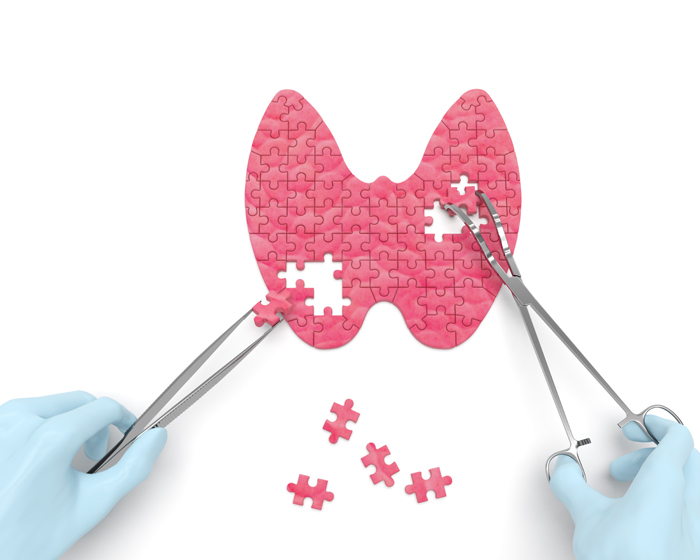Thyroid Gland Removal Surgery in Karol Bagh, Delhi
Thyroid removal is a procedure that is also known as a thyroidectomy. It is a surgical procedure for the removal of a part of your thyroid or the complete thyroid gland.

What do we need to know about thyroid removal?
The thyroid produces multiple hormones that control almost all parts of your metabolism. Since it controls the basal metabolic rate, it indirectly is in control of your heart rate and also how fast you burn your calories.
Thyroidectomy or thyroid removal surgery has multiple approaches:
- Conventional thyroidectomy
- Transoral thyroidectomy
- Endoscopic thyroid removal
To opt for thyroid removal, you can consult a general surgery doctor near you or you can visit a general surgery hospital near you.
When is thyroid removal surgery recommended? What are the symptoms?
Your doctor may recommend a thyroid removal surgery if you have the following conditions:
- Cancer of the thyroid gland - it is the most common reason for removal of the thyroid gland. In case of thyroid cancer, the gold standard treatment method is usually the removal of a part of the thyroid gland.
- Goiter - this is a condition wherein there is a non-cancerous enlargement of the thyroid gland. This leads to excessive discomfort in breathing or swallowing. In some conditions, goiter also leads to hyperthyroidism. In such conditions, your healthcare provider recommends removal of a part of the thyroid or the complete thyroid gland.
- Hyperthyroidism - this is a condition of overactivity of the thyroid. In this condition, the thyroid gland produces too much of the thyroxine hormone. Your physician usually treats the problem with antithyroid drugs and radioactive iodine therapy. However, thyroid removal is considered as a last resort for the treatment of this condition.
- Indeterminate thyroid nodules - sometimes thyroid nodules cannot be identified as cancerous. Their benign or malignant nature is not found out even after a needle biopsy is done. In such cases, doctors may recommend that complete thyroid removal is done to eliminate the risk of the nodules being malignant or cancerous in nature.
When should you consult with your healthcare provider?
Although the surgery may be recommended in multiple situations, it is important to take a note of any changes in your body. Since the thyroid hormone is responsible for maintaining the basal metabolic rate, the symptoms of overactivity of thyroid are easily visible. Some of them are:
- Rapid heart rate
- Irregular heart rate
- Increased appetite
- Unintentional loss of weight
- Tremors
- Profuse sweating
You can request an appointment at Apollo Spectra Hospitals, Tardeo,Mumbai.
Call 1860 500 2244 to book an appointment.
What are the risk factors associated with thyroid removal surgery?
These may include:
- Excess bleeding
- Infection
- Hypoparathyroidism
- Airway obstruction
- Permanent hoarse voice
What are the results of a thyroid removal surgery?
Results and long-term effects depend on how much of the gland is removed.
- Partial thyroid removal - in the case of a partial thyroidectomy, only a part of the thyroid gland is removed. In such conditions, the remaining portion of the thyroid gland usually takes over the body's function of producing thyroid hormone. In such conditions, the patient may not require thyroid hormone therapy. Your physician establishes this with a set of diagnostic tests.
- Complete thyroidectomy - in case the entire thyroid gland has been removed, the body is unable to make thyroid hormones. In such conditions that lead to the development of hypothyroidism, synthetic thyroid supplements are provided. Synthetic thyroid supplements imitate the normal thyroid hormone that is usually made in the body.
Conclusion
Thyroidectomy is usually performed to treat disorders of the thyroid gland. The disorders often include cancer, a non-cancerous enlargement of the thyroid gland which is also known as goiter and overactivity of the thyroid which is known as hyperthyroidism.
Thyroidectomy usually takes around 1 to 2 hours. However, the surgery may require more time or less time depending on the extent of the surgery that is needed.
Surgeons perform a typical thyroidectomy under general anesthesia.
People can usually go home and assume normal activity. However, doctors advise up to 2 weeks of rest. The scars from the surgery take about a year to fade.
Symptoms
Our Doctors
DR. KEYUR SHETH
DNB (Med), DNB (Gast...
| Experience | : | 7 Yeras Experience |
|---|---|---|
| Speciality | : | General Surgery & Ga... | Location | : | Chembur |
| Timings | : | Mon to Fri : 2:00 PM... |
Our Top Specialities
NOTICE BOARD
CONTACT US
CONTACT US
 Book Appointment
Book Appointment



.svg)
.svg)
.svg)
.svg)








